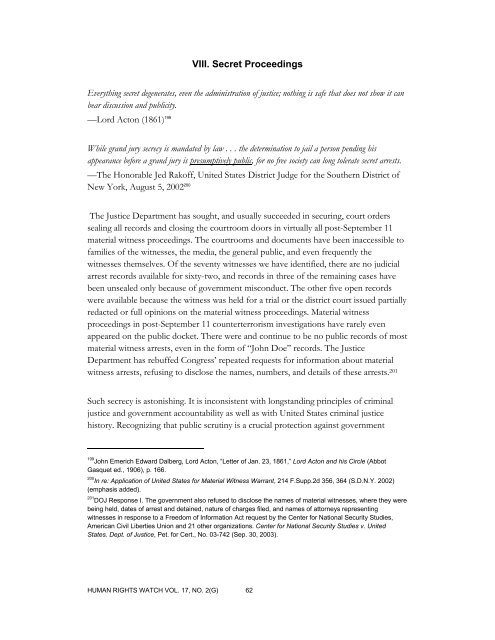Witness to Abuse - Human Rights Watch
Witness to Abuse - Human Rights Watch
Witness to Abuse - Human Rights Watch
You also want an ePaper? Increase the reach of your titles
YUMPU automatically turns print PDFs into web optimized ePapers that Google loves.
VIII. Secret Proceedings<br />
Everything secret degenerates, even the administration of justice; nothing is safe that does not show it can<br />
bear discussion and publicity.<br />
—Lord Ac<strong>to</strong>n (1861) 199<br />
While grand jury secrecy is mandated by law . . . the determination <strong>to</strong> jail a person pending his<br />
appearance before a grand jury is presumptively public, for no free society can long <strong>to</strong>lerate secret arrests.<br />
—The Honorable Jed Rakoff, United States District Judge for the Southern District of<br />
New York, August 5, 2002 200<br />
The Justice Department has sought, and usually succeeded in securing, court orders<br />
sealing all records and closing the courtroom doors in virtually all post-September 11<br />
material witness proceedings. The courtrooms and documents have been inaccessible <strong>to</strong><br />
families of the witnesses, the media, the general public, and even frequently the<br />
witnesses themselves. Of the seventy witnesses we have identified, there are no judicial<br />
arrest records available for sixty-two, and records in three of the remaining cases have<br />
been unsealed only because of government misconduct. The other five open records<br />
were available because the witness was held for a trial or the district court issued partially<br />
redacted or full opinions on the material witness proceedings. Material witness<br />
proceedings in post-September 11 counterterrorism investigations have rarely even<br />
appeared on the public docket. There were and continue <strong>to</strong> be no public records of most<br />
material witness arrests, even in the form of “John Doe” records. The Justice<br />
Department has rebuffed Congress’ repeated requests for information about material<br />
witness arrests, refusing <strong>to</strong> disclose the names, numbers, and details of these arrests. 201<br />
Such secrecy is as<strong>to</strong>nishing. It is inconsistent with longstanding principles of criminal<br />
justice and government accountability as well as with United States criminal justice<br />
his<strong>to</strong>ry. Recognizing that public scrutiny is a crucial protection against government<br />
199<br />
John Emerich Edward Dalberg, Lord Ac<strong>to</strong>n, “Letter of Jan. 23, 1861,” Lord Ac<strong>to</strong>n and his Circle (Abbot<br />
Gasquet ed., 1906), p. 166.<br />
200<br />
In re: Application of United States for Material <strong>Witness</strong> Warrant, 214 F.Supp.2d 356, 364 (S.D.N.Y. 2002)<br />
(emphasis added).<br />
201<br />
DOJ Response I. The government also refused <strong>to</strong> disclose the names of material witnesses, where they were<br />
being held, dates of arrest and detained, nature of charges filed, and names of at<strong>to</strong>rneys representing<br />
witnesses in response <strong>to</strong> a Freedom of Information Act request by the Center for National Security Studies,<br />
American Civil Liberties Union and 21 other organizations. Center for National Security Studies v. United<br />
States. Dept. of Justice, Pet. for Cert., No. 03-742 (Sep. 30, 2003).<br />
HUMAN RIGHTS WATCH VOL. 17, NO. 2(G) 62
















